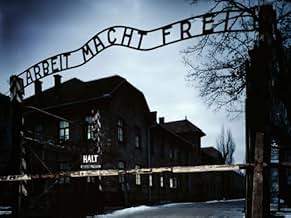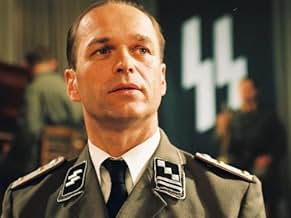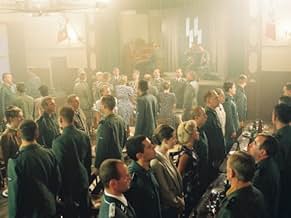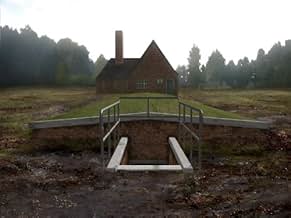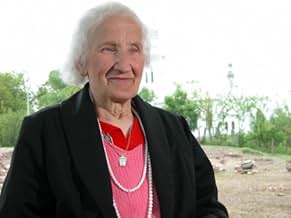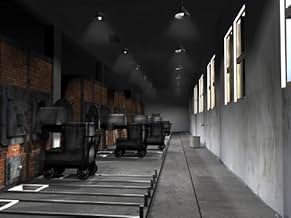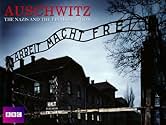Auschwitz: The Nazis & the 'Final Solution'
- TV Mini Series
- 2005
- 48m
IMDb RATING
8.6/10
4.7K
YOUR RATING
The history of the Final Solution phase of the Nazi Holocaust, particularly with the most infamous of the death camps.The history of the Final Solution phase of the Nazi Holocaust, particularly with the most infamous of the death camps.The history of the Final Solution phase of the Nazi Holocaust, particularly with the most infamous of the death camps.
Browse episodes
Featured reviews
People involved with the production of this documentary understand and achieve the maturity in which not many people attain. It is that the facts of the Holocaust need no over-dramatisation at all. A simplistic and even storytelling, plus fairness and calmness, is just right, if one wants real impact for the audience. This piece of excellent journalism establishes the evolutionary nature of a thinking mind: it grows on you. Watching this documentary is comparable to hearing a politely confident voice taking us down the road we do not plan to complete the journey. Just like death camps themselves, or the mind of the Jewish and other victims at the time, people in the field did not know what they were up against. Unfortunate circumstances, at first, had led to bad, worse, and finally hopeless situation for those violated and abused at the extreme. Some people lost their sense of optimism and logical thinking. Some people firmly believed that "God" had completely forgotten this Hell on earth, or simply found it too much of a Hell to visit. I think that the producers and directors of this documentary had wanted to walk us step by step, without attempting to let us presume anything. Personal judgment at the end, therefore, is genuine. I believe it is by way of honouring this dark saga of human tragedy most properly. it is too large an issue to be pre-cooked. It must be knowledgeably and decently presented to the audience, and let that audience figure out themselves. This documentary feature has accomplished that task. People who watch would have the memories with them for life. I grew up all my life in Asia. Far away from Hell of Auschwitz and other death camps a million miles apart. Yet, I feel the feeling. I feel the historical task to do whatever I can about it. Yes, I share.
This is a superbly produced documentary, based largely on information that has come to light since information from the eastern bloc countries and former Soviet Union became accessible.
The documentary comprises mainly of interviews with surviving SS soldiers and surviving prisoners from the Auschwitz and similar camps. It uses CGI special effects, combined with film of the Auschwitz camps to achieve the most realistic reconstruction of how it looked, and how it operated. Dramatisations of various meetings and events have been authentically reconstructed with well cast actors.
The stories from the survivors, particular in the episode about children, are the most moving I've ever seen in a documentary. The combination of original photographs, moving music and a first hand account from a survivor make these stories most poignant.
It does not demonize the Nazi's, but gives in insight into the mentality that pervaded the regime. It shows them as lacking empathy. We see evidence that not only the Germans, but many French, many Hungarians and many Slovakians were only too willing to help deport their Jews; even the British Police, on the Nazi occupied Channel Islands, were willing to send Jews to the east. Finally, the documentary shows how the surviving Jews, or their return to their homeland, were treated badly by their fellow countrymen.
This documentary shows that what happened in the holocaust happened because humans, not just Nazi's, are capable doing terrible things to humanity, given a certain set of circumstances.
The documentary comprises mainly of interviews with surviving SS soldiers and surviving prisoners from the Auschwitz and similar camps. It uses CGI special effects, combined with film of the Auschwitz camps to achieve the most realistic reconstruction of how it looked, and how it operated. Dramatisations of various meetings and events have been authentically reconstructed with well cast actors.
The stories from the survivors, particular in the episode about children, are the most moving I've ever seen in a documentary. The combination of original photographs, moving music and a first hand account from a survivor make these stories most poignant.
It does not demonize the Nazi's, but gives in insight into the mentality that pervaded the regime. It shows them as lacking empathy. We see evidence that not only the Germans, but many French, many Hungarians and many Slovakians were only too willing to help deport their Jews; even the British Police, on the Nazi occupied Channel Islands, were willing to send Jews to the east. Finally, the documentary shows how the surviving Jews, or their return to their homeland, were treated badly by their fellow countrymen.
This documentary shows that what happened in the holocaust happened because humans, not just Nazi's, are capable doing terrible things to humanity, given a certain set of circumstances.
This is the story of the Nazi concentration camp of Auschwitz. We follow it from the very beginning in 1940 until its liberation by Russian troops in January 1945. We also get a glimpse of the aftermath in the form of the Nuremberg trials and we follow the destiny of central figures in the extermination of Jews, Gypsys, Russian POWs and political prisoners from mainly Poland. One of the most unpleasant aspects of this story is that some of the survivors of the camps has lead a miserable life after the war as they were not welcomed by various reasons when they returned home.
The series contains 6 episodes of about 45 minutes each. It is build up by interviews of former prisoners as well as a couple of guards. There is also extensive footage in the form of photography, film-clips and various documents.
In an attempt to make the story come more alive the producers have also hired German actors to play out the role of central figures in Auschwitz; Rudolf Höss, Adolf Eichman, Heinrich Himmler and Dr. Joseph Mengele to name a few. With the help of computer techniques the buildings of Auschwitz has been rebuild in order to get a view of how the camp looked like with specific attention to the gas-chambers and the barracks were the prisoners lived.
So a lot of work has been put into telling the story of one of the darkest chapters in human history. It is truly a depressing tale that leaves you with the big (and unanswered) question: how could this happen? And how can we avoid this happening again? For some reason BBC has chosen not to interview other than eye witnesses and therefore I personally was missing the explanation that a historian, sociologist etc could give to the phenomenon of Holocaust. As a psychologist myself I wondered about this; how can the combination of hatred and discipline be stronger than empathy with the prisoners? Empathy is not something that we choose but something that is always there. So how could those that were involved with the slaughtering of the prisoners not empathize with them? Maybe they did empathize with them after all - but empathy does not always lead to sympathy. It can also lead to sadism I think. Either way, the ability to empathize would dictate that the Germans were not unaffected by their actions which we also are told. Höss never liked the killings and especially in the beginning when it was done by shooting it made him uneasy.
One of the more controversial stories that are being told is that the allied forces refused to bomb the railroad-tracks leading to Auschwitz although they knew what was going on and although they were bombing IG Farben only 6 kilometers away. We have an eyewitness from Auschwitz telling us, that she saw the airplanes from the allied forces flying by and from an air photo of the camp we see that it is easy to identify the crematorium. Why didn't the allied forces drop a few bombs? This is really beyond me and makes me wonder if the allied had some sort of hidden agenda.
Another more controversial story is the story of the Hungarian Jews. The Germans apparently tried to bargain with their lives and wanted trucks in exchange of Jews. In a document from the allied forces we learn that it was seen as "blackmail" and that the allied forces saw a big problem in getting around 700.000 (I think) Jews to house and to feed. So the consequence was that they went straight to Auschwitz and the gas chambers.
Especially one interview with a guard by the name of Oskar Gröning is remembered; he is without remorse but decided to participate when he learned that theHolocaust by some people are being denied. The lack of remorse is interesting. It is tempting to understand the absence of this as a result of defense mechanisms at work.
I will not give this top rating as there was too much description and too little explanation. I also think that it was unnecessary to employ actors. A good narrative could have done the work instead. On the other hand you have the invaluable interviews with the eyewitnesses who will be dead and gone in a few years.
Regards Simon
The series contains 6 episodes of about 45 minutes each. It is build up by interviews of former prisoners as well as a couple of guards. There is also extensive footage in the form of photography, film-clips and various documents.
In an attempt to make the story come more alive the producers have also hired German actors to play out the role of central figures in Auschwitz; Rudolf Höss, Adolf Eichman, Heinrich Himmler and Dr. Joseph Mengele to name a few. With the help of computer techniques the buildings of Auschwitz has been rebuild in order to get a view of how the camp looked like with specific attention to the gas-chambers and the barracks were the prisoners lived.
So a lot of work has been put into telling the story of one of the darkest chapters in human history. It is truly a depressing tale that leaves you with the big (and unanswered) question: how could this happen? And how can we avoid this happening again? For some reason BBC has chosen not to interview other than eye witnesses and therefore I personally was missing the explanation that a historian, sociologist etc could give to the phenomenon of Holocaust. As a psychologist myself I wondered about this; how can the combination of hatred and discipline be stronger than empathy with the prisoners? Empathy is not something that we choose but something that is always there. So how could those that were involved with the slaughtering of the prisoners not empathize with them? Maybe they did empathize with them after all - but empathy does not always lead to sympathy. It can also lead to sadism I think. Either way, the ability to empathize would dictate that the Germans were not unaffected by their actions which we also are told. Höss never liked the killings and especially in the beginning when it was done by shooting it made him uneasy.
One of the more controversial stories that are being told is that the allied forces refused to bomb the railroad-tracks leading to Auschwitz although they knew what was going on and although they were bombing IG Farben only 6 kilometers away. We have an eyewitness from Auschwitz telling us, that she saw the airplanes from the allied forces flying by and from an air photo of the camp we see that it is easy to identify the crematorium. Why didn't the allied forces drop a few bombs? This is really beyond me and makes me wonder if the allied had some sort of hidden agenda.
Another more controversial story is the story of the Hungarian Jews. The Germans apparently tried to bargain with their lives and wanted trucks in exchange of Jews. In a document from the allied forces we learn that it was seen as "blackmail" and that the allied forces saw a big problem in getting around 700.000 (I think) Jews to house and to feed. So the consequence was that they went straight to Auschwitz and the gas chambers.
Especially one interview with a guard by the name of Oskar Gröning is remembered; he is without remorse but decided to participate when he learned that theHolocaust by some people are being denied. The lack of remorse is interesting. It is tempting to understand the absence of this as a result of defense mechanisms at work.
I will not give this top rating as there was too much description and too little explanation. I also think that it was unnecessary to employ actors. A good narrative could have done the work instead. On the other hand you have the invaluable interviews with the eyewitnesses who will be dead and gone in a few years.
Regards Simon
2005 was a good year for the BBC. They had Rome, they resurrected the Doctor Who franchise - but before all that, they created Auschwitz - The Nazis and the "Final Solution", which was, without doubt, their best WWII show yet. This harrowing account of what life was like inside the Nazi death camp uses real life footage, powerful and realistic dramatization sequences, and interviews with people who were there to create one of the most powerful mini-series ever broadcast on television. It shows the horrors of Auschwitz and other death camps in Germany and Poland to a generation who have never been forced to endure it, and uses the latest computer trickery to show to you the atrocious conditions in which the Jews lived. This is more than just a mini-series - it is a masterpiece, and lets everybody know that we are not to let things like this ever happen again. From the first to the final episode, I watched it with amazement, learning more and more about what happened in Europe over 60 years ago, and thinking "Why?". It is not the sort of thing you should watch for enjoyment - you watch it to remember those who died at Auschwitz, and think about their struggles and fears, and hope that no race ever treats another people like that ever again.
If you can see this show, do see it, as it is a harrowing, powerful, and well-researched tribute to the six million people who died because of the immense cruelty of the Nazis. A must-see. 10/10
If you can see this show, do see it, as it is a harrowing, powerful, and well-researched tribute to the six million people who died because of the immense cruelty of the Nazis. A must-see. 10/10
The documentary impressed me, it has a different approach from others that I have watched. It described a detailed physical and a social situations of the camp. In the end of each chapter, you can understand a little more deeply what it had represented for the Jewish people, the foreigners, the families, the Nazis, all the horror and the distorted ideas that make all these things happened. For the people who experienced it and all the political involved, all the consequences for all nations involved and the thoughts of "Nazi", in the final I was sad and I think the history have a power to educate ourselves to be a better person, not repeat the atrocities, the ideal to exterminated a race is outrageous, we are not God and we can't decide the their destiny.
Did you know
- TriviaAll entries contain spoilers
- Alternate versionsIn Spain, on January 29, 2005, a 104-minute cut was premiered on television. Hosted by the actress María Galiana, and with additional interviews to the Spanish survivors Jaume Álvarez, Enric Marcó and Neus Català. And co-produced by Sagrega TV, SA.
- ConnectionsFeatured in Un jour à Auschwitz (2020)
- How many seasons does Auschwitz: Inside the Nazi State have?Powered by Alexa
Details
- Release date
- Countries of origin
- Official site
- Language
- Also known as
- Auschwitz: Inside the Nazi State
- Filming locations
- Production companies
- See more company credits at IMDbPro
- Runtime48 minutes
- Color
- Sound mix
- Aspect ratio
- 1.78 : 1
Contribute to this page
Suggest an edit or add missing content

Top Gap
By what name was Auschwitz: The Nazis & the 'Final Solution' (2005) officially released in India in English?
Answer
